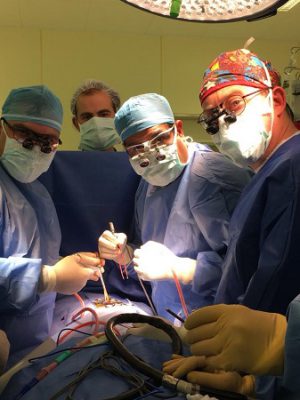
Many years ago, neurosurgeon Andrés Vargas, born in Tucumán, Argentina, chose to live in Israel and practice medicine at Hadassah Hospital Ein Kerem. Recently, he was interviewed by Argentina’s Jewish newspaper, Iton Gadol, where he described his admiration for professional life at Hadassah, as well as Hadassah’s historic generosity in sharing medical expertise with colleagues in Tucumán.
Dr. Vargas’ connection to Hadassah began when Prof. Felix Umansky, then head of neurosurgery at Hadassah, came to his hometown to give a set of lectures. Prof. Umansky invited Dr. Vargas to come work at Hadassah. Accepting the offer, Dr. Vargas was given the opportunity to do a residency in neurosurgery, a specialty that was not available in Tucumán at the time. Dr. Vargas’ intention had been to train in Israel and then return to his hometown, but, as he relates, when he completed his residency, he was offered the opportunity to further specialize in spine surgery. “For me, that was quite attractive,” he notes, because Hadassah was innovative and had a robotics system. Elaborating on his comment, Dr. Vargas says, “You have options all the time. I already traveled twice to Germany to learn about medical innovations. When something new comes out, we see it. For example, the best microscope for neurosurgery recently came out and we already have it. Here we have the best in innovation and technology.”
Dr. Vargas also spoke admiringly of the help that Hadassah physicians have provided to their colleagues in Tucumán, dating back to 2001. When Tucumán’s children were suffering from malnutrition, Hadassah epidemiologists came to Tucumán, studied their predicament, and, together with then Minister of Health and Environment Dr. Juan Manzur, helped create a program to alleviate the problem. Dr. Manzur, now Tucumán’s governor, maintains a close bond with Hadassah.
Although Dr. Vargas, a member of the surgical team that operated on former Prime Minister Ariel Sharon, is not Jewish and did not know Hebrew when he first immigrated to Israel, he took on the challenge, learning the language initially through a course. But, as he adds, “the best Hebrew school was the hospital because one is in contact with nurses, patients, and families speaking the language.” At the same time, Dr. Vargas appreciates the opportunity to treat patients of diverse nationalities. “For me, there is no difference in nationality,” he says. “They are all patients. In Hadassah, all patients are equal. There is no discrimination. I operate often on Palestinian patients from Gaza. We have a team that handles the authorizations.”
While Dr. Vargas acknowledges that beginnings in a foreign country are difficult, he believes that anyone who decides to move to Israel will experience “great development in his life, and not just professionally.”
Read the full interview of Dr. Vargas in Iton Gadol
